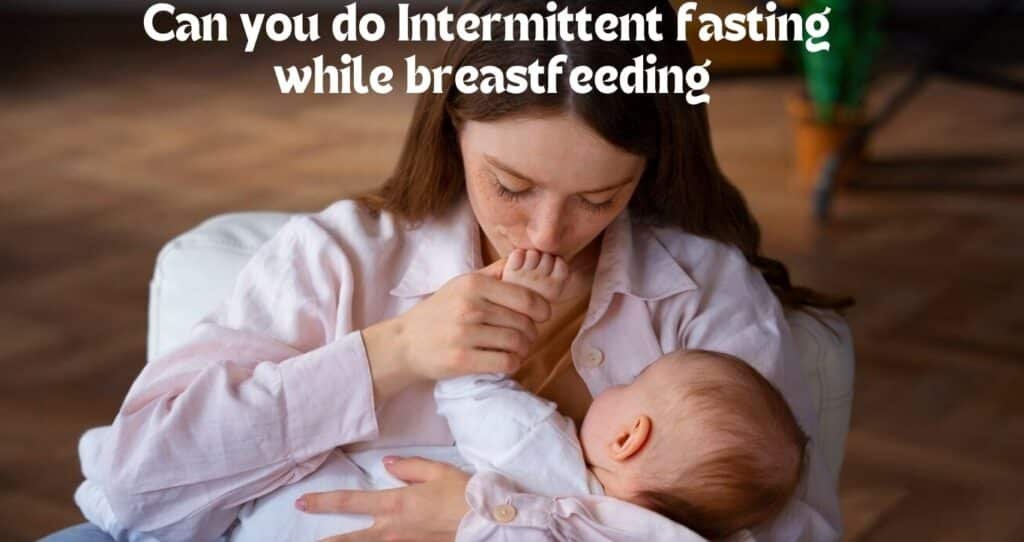Introduction
As a new mom, you’re juggling sleepless nights, constant feedings, and the desire to regain your pre-pregnancy body. But is intermittent fasting (IF) the right choice while breastfeeding? Naturally, weight management is on your mind, and you might consider intermittent fasting (IF) as a potential strategy. While IF is widely recognized for its health benefits, one of the common questions arises “Can you do intermittent fasting while breastfeeding?” Could it affect your milk production? Might it impact your baby’s health?

Understanding the potential risks and benefits is crucial before making any dietary changes. In this comprehensive guide, we’ll dive deep into intermittent fasting, explore the possible risks for a breastfeeding mother, and outline safe approaches if you decide to try it. Whether you’re a new mom looking for a sustainable way to lose weight or simply curious about how IF works, this article will provide well-researched insights to help you make an informed decision.
What Is Intermittent Fasting?
Intermittent fasting is an eating pattern that cycles between periods of eating and fasting periods. Unlike traditional diets that focus on what you eat, IF emphasizes when you eat. By structuring meals within specific timeframes, the body undergoes metabolic shifts that can aid in fat loss, regulate insulin levels, and reduce chronic inflammation.
Here are some common methods of intermittent fasting:
16:8 Method: This approach involves fasting for 16 hours and eating within an 8-hour eating window. Many people find this method easy to follow by skipping breakfast and consuming meals between noon and 8 p.m.
Alternate-Day Fasting: In this method, individuals eat normally one day and then significantly reduce their calorie intake (or completely fast) the next day. This pattern is more intense and requires careful planning, particularly for breastfeeding moms who have increased nutritional needs.

5:2 Method: This strategy allows normal eating for five days of the week while restricting calorie intake on the other two days (typically consuming 500–600 calories on fasting days).
While IF offers several health benefits, including weight management, improved insulin levels, and reduced chronic inflammation, breastfeeding mothers must consider its impact on their nutritional status, milk production, and overall energy levels.
You can refer to the article where you can get to know more about Intermittent fasting and join us for 28 day challenge
Can you do intermittent fasting while breastfeeding?
Intermittent fasting while breastfeeding is a delicate balance, and its safety depends on various factors like your overall health, daily calorie intake, and hydration levels.
Breastfeeding is already a full-time job for your body, it burns around 500 extra calories per day just to keep up with milk production. If you’re not eating enough or missing out on key nutrients, your milk supply could take a hit, which might affect your baby’s health and well-being.

During the early months when your baby relies entirely on you for nourishment, fasting isn’t the best idea. Cutting back on calories at this stage could leave you feeling exhausted, impact your milk production, and ultimately affect your baby’s weight and nutrition. Instead, this is the time to focus on fueling your body with a healthy diet of extra 350 to 500 calories a day it needs to keep both you and your baby thriving.
“When you’re breastfeeding, your body is working overtime to nourish your baby. If you’re not eating enough because of fasting, it can lower your milk supply and drain your energy, neither of which are great for a new mom trying to keep up with the demands of motherhood.”
How to Approach Intermittent Fasting Safely While Breastfeeding
If you’re determined to try intermittent fasting while nursing, it’s essential to do so safely. Here are some guidelines to consider:
1. Consult a Healthcare Professional Speak with a doctor or lactation consultant before making any dietary changes. They can assess your health, nutritional status, and milk supply to ensure fasting won’t negatively impact you or your baby.
2. Start with a Gentle Approach Instead of jumping into long fasting periods, begin with a 12-hour fast (e.g., from 8 p.m. to 8 a.m.), which naturally aligns with your sleep cycle. This allows your body to adjust without significantly impacting your energy levels or milk production. Gradually increase the fasting window only if you feel strong and well-nourished and your milk supply remains steady.
3. Prioritize Nutrient-Dense Foods When you do eat, focus on high-quality, nutrient-rich foods to ensure your body gets everything it needs. Include lean proteins (chicken, eggs, fish), healthy fats (avocados, nuts, olive oil), complex carbohydrates (quinoa, sweet potatoes, whole grains), and plenty of fruits and vegetables. This will help keep your energy levels stable and support your milk supply.

4. Stay Hydrated Dehydration is a major risk factor for decreased milk production. Make sure you drink plenty of water throughout the day, along with herbal teas or electrolyte-rich drinks if needed. A good rule of thumb is to drink a glass of water each time you nurse your baby.
5. Listen to Your Body Motherhood is already demanding, and adding fasting to the mix should not make it harder. If you notice signs of fatigue, low milk supply, dizziness, or increased hunger, it may be best to reconsider fasting or adjust your approach. Your well-being and your baby’s health should always come first.
How Breastfeeding Affects Your Body
Breastfeeding is an energy-intensive process that places high demands on your body. To sustain a steady milk supply, you need extra calories per day, depending on your metabolism and activity level. These additional calories help fuel milk production and ensure you receive adequate nutrition for postpartum recovery.
Your body also prioritizes your baby’s nutritional needs over your own, meaning if you don’t consume enough essential nutrients, your body will pull from its own stores to maintain the quality of your breast milk. This can leave you feeling depleted and increase the risk of deficiencies if you’re not mindful of your diet.
Beyond calories, breastfeeding also affects your hormone levels. Prolactin, the hormone responsible for milk production, rises during nursing sessions, promoting lactation but also potentially increasing your appetite. Oxytocin, another hormone involved in breastfeeding, helps with bonding and relaxation but can also cause dehydration if you’re not consuming enough fluids. These biological factors make it even more crucial to maintain a balanced diet and hydration levels while nursing.
Potential Effects of Fasting on Milk Supply
Fasting while breastfeeding can have varying effects depending on the duration and how well you manage your calorie and fluid intake.
Short-Term Fasting (12-16 Hours): If you already have a well-established milk supply and ensure adequate calorie intake during your eating window, short fasting periods may not drastically affect lactation. Staying well-hydrated and consuming nutrient-dense meals can help maintain milk production. Many mothers naturally go without food for longer stretches at night, which mimics a mild fasting period without adverse effects.
Longer Periods of Fasting (24+ Hours): Extended fasting can lead to a drop in energy levels, reduced milk production, and an increased risk of dehydration. Since milk production depends on consistent calorie intake and hydration, restricting food and fluids for long periods may send signals to your body to conserve resources, potentially leading to a lower milk supply. Some women may notice changes in the fat content of their milk, which could impact their baby’s energy intake and overall development.
Impact on Nutrient Levels
Nutrient availability plays a crucial role in breastfeeding, affecting both your health and your baby’s growth. When fasting, certain vitamins and minerals may be depleted more quickly, especially if your intake isn’t sufficient to replenish them.
Folic Acid: Essential for DNA synthesis and cell growth, folic acid is critical for postpartum recovery and your developing fetus. A deficiency can lead to fatigue, weakness, and, in severe cases, developmental concerns in infants. Since many sources of folic acid, like leafy greens and legumes, are best consumed regularly, fasting may limit your intake if not carefully planned.
Healthy Fats: Breast milk naturally contains a high percentage of fat, which provides essential energy for your baby. Omega-3 fatty acids, found in foods like salmon, flaxseeds, and walnuts, support brain and eye development. If your diet lacks these essential fats due to fasting, the fat composition of your breast milk may be altered, potentially affecting your baby’s cognitive growth.

Electrolytes (Sodium, Potassium, Magnesium): Hydration isn’t just about drinking enough water, your body also needs electrolytes to maintain proper fluid balance and muscle function. Extended fasting without sufficient electrolyte intake can lead to dehydration, headaches, and fatigue, which may, in turn, impact milk supply and overall well-being.
Protein & Iron: Protein is necessary for postpartum healing and sustaining milk production, while iron helps prevent anemia, which is common after childbirth. Fasting for extended periods without consuming enough protein-rich foods like eggs, dairy, and lean meats can lead to muscle loss and reduced stamina, making it harder to keep up with the demands of motherhood.
Is Intermittent Fasting Safe While Breastfeeding?
Intermittent fasting while breastfeeding is a delicate balance, and its safety depends on various factors like your overall health, daily calorie intake, and hydration levels.
While some moms may be able to practice short fasting windows without issues, others may experience a decrease in milk supply, low energy levels, or nutrient deficiencies. Here’s what experts recommend ensuring safety:
1. Consult Your Healthcare Provider First
Before making any major dietary changes, talk to a healthcare provider, lactation consultant, or registered dietitian. They can help you determine whether intermittent fasting is safe based on your postpartum recovery, milk supply, and overall well-being.
Mothers with certain health conditions, such as diabetes, thyroid disorders, or anemia, should be especially cautious, as fasting can affect blood sugar levels, metabolism, and iron stores. If you’ve had difficulties with milk supply in the past, a professional can help tailor a plan that ensures you get enough calories and nutrients without compromising lactation.

2. Timing Matters: When to Try Intermittent Fasting
The timing of introducing fasting is crucial for breastfeeding moms. Consider these factors:
Early postpartum period (0-3 months): Avoid intermittent fasting entirely during this stage, as your body is still recovering from childbirth, and your milk supply is being established. Cutting calories too soon can affect your energy, healing, and milk production.
3-6 months postpartum: If your milk supply is well-established, you might be able to introduce a mild fasting window (such as 12 hours overnight). However, extended fasting could still affect energy levels and hydration.
6+ months postpartum: If your baby has started eating solids and relies less on breast milk for nutrition, you may have more flexibility in experimenting with intermittent fasting. Even at this stage, it’s important to monitor how your body responds and adjust accordingly.
Listen to your body: If you experience fatigue, dizziness, headaches, low milk supply, or increased hunger, fasting may not be suitable at this time. Your body is still prioritizing your baby’s needs, so proper nourishment is key.
3. Focus on Nutrient-Dense Foods
Intermittent fasting isn’t just about when you eat—it’s also about what you eat. Your eating window should be filled with high-quality, nutrient-dense foods to fuel your body and support milk production. Here’s how to make the most of your meals:
Healthy Fats: Essential for brain function and milk composition. Include foods like avocados, nuts, seeds, olive oil, fatty fish (salmon, sardines), and coconut oil.
Lean Proteins: Protein supports postpartum healing, energy levels, and muscle recovery. Good sources include eggs, poultry, tofu, legumes, dairy products, and lean cuts of meat.
Complex Carbohydrates: Whole grains, quinoa, oats, and starchy vegetables (like sweet potatoes) provide sustained energy and essential fiber to aid digestion.
Iron-Rich Foods: Pregnancy and childbirth can deplete iron stores. Incorporate iron-rich foods like spinach, lentils, red meat, fortified cereals, and beans.
Hydration is Key: Dehydration is a major concern for breastfeeding moms, especially when fasting. Aim for at least 8-10 glasses of water daily, and include electrolyte-rich fluids like coconut water or herbal teas to stay hydrated.
Vitamin and Mineral Balance: Ensure you’re getting enough calcium, vitamin D, and B vitamins by consuming dairy, fortified plant-based milk, leafy greens, and nuts.
Potential Risks of Intermittent Fasting While Breastfeeding
While intermittent fasting (IF) may offer a variety of potential benefits, it is important to consider the possible risks it poses, particularly for breastfeeding mothers. Here are some key concerns:
1. Reduced Milk Supply: Engaging in intermittent fasting may lead to a significant drop in caloric intake. This could ultimately result in decreased milk production, which is crucial for your baby’s growth and development. Insufficient milk supply can compromise your baby’s nutrition, leading to potential health issues.
2. Low Energy Levels: The practice of fasting can often lead to feelings of fatigue and low energy. This depletion of energy may hinder your ability to care for your baby effectively and can affect your overall motivation to engage in physical activities, which are important for your well-being.
3. Risk of Dehydration: Breastfeeding significantly increases the body’s demand for fluids. When combined with fasting, there is a heightened risk of dehydration, especially if you’re not prioritizing hydration during eating periods. Dehydration can have serious consequences not just for your health, but also for your milk supply and overall breastfeeding experience.
4. Nutrient Deficiencies: Restricting food intake can lead to inadequate consumption of essential nutrients. For example, vital nutrients like folic acid, which are crucial for your body’s recovery during the postpartum phase, may become deficient. This could not only affect your health but also your ability to provide the necessary nutrients for your baby through breastfeeding.
How to Safely Explore Intermittent Fasting While Breastfeeding
If you’re considering intermittent fasting (IF) while nursing, it’s essential to approach it with caution to ensure both your health and your baby’s health. Here are some comprehensive tips to help you navigate this journey safely:
1. Choose a Shorter Fasting Window
Opt for a more manageable approach, such as the 16:8 method, where you fast for 16 hours and eat during an 8-hour window. This method allows for more frequent meals compared to alternate-day fasting or extended fasting periods, making it easier to meet your nutritional needs.
2. Stay Hydrated
Maintaining proper hydration is crucial, especially when fasting. Drink plenty of water throughout your fasting periods to support milk production and prevent dehydration. Herbal teas (without caffeine) can also be a good option to help keep your fluid intake up.
3. Eat Nutrient-Dense Meals
During your eating window, prioritize nutrient-dense foods that will provide you with the energy and nourishment you need. Incorporate healthy fats like avocados and nuts, lean proteins such as chicken and fish, and wholesome grains like quinoa and brown rice. These foods will help you meet your caloric needs and support both your health and lactation.

4. Monitor Your Milk Supply
Pay close attention to your breast milk supply and your baby’s feeding patterns. If you notice any decrease in your milk production or changes in your baby’s feeding behavior, such as fussiness or increased hunger, it may be necessary to reassess your fasting schedule or consider stopping it altogether to ensure your baby’s nutritional needs are being met.
5. Avoid Extreme Diets
It’s prudent to steer clear of extreme dietary approaches, such as the ketogenic diet or keto die, which can significantly limit your caloric intake. Such restrictions might negatively impact your milk production and overall health while breastfeeding, so keeping your diet balanced is key.
By following these tips, you can explore intermittent fasting safely while continuing to provide the best for your baby. Always listen to your body and consult a healthcare professional if you have any concerns.
What Experts Say About Intermittent Fasting and Breastfeeding
Dr. Andrew Huberman (Neuroscientist, Stanford University)
Dr. Andrew Huberman, a leading researcher in neurobiology, often discusses the science of fasting, metabolism, and circadian rhythms. He explains that fasting affects insulin levels, hormone regulation, and energy levels, but he also highlights that fasting isn’t for all.
While he acknowledges that time-restricted eating (a form of IF) can improve metabolic health, there’s little research on how it impacts breast milk supply and baby’s health. His advice? If you’re breastfeeding, you need to prioritize proper nutrition, hydration, and caloric intake before attempting any fasting regimen.
Torey Armul (Registered Dietitian, Academy of Nutrition and Dietetics)
Torey Armul warns that fasting could lower a mother’s energy levels, making it harder to keep up with the demands of a newborn. Since producing breast milk requires extra calories, restricting food intake for long periods might impact milk production and overall nutrition.
Dr. Eric Berg (Chiropractor & Nutrition Expert)
Dr. Berg promotes ketogenic diets and intermittent fasting but acknowledges that breastfeeding mothers require extra calories to support both themselves and their babies. He suggests focusing on a nutrient-dense diet filled with healthy fats, proteins, and complex carbs if trying fasting.
Amazing guide in Amazon
Designed to help you burn fat, boost metabolism, and balance hormones—without feeling deprived! Unlike restrictive diets, intermittent fasting works by cycling between eating and fasting periods, allowing your body to burn fat more efficiently, improve energy levels, and support hormonal health, essential for mood, metabolism, and menstrual well-being. Whether you’re a beginner or looking to refine your routine, this flexible and science-backed approach fits seamlessly into any lifestyle. Get your copy on Amazon Kindle today and take control of your health effortlessly!
Alternatives to Intermittent Fasting for Postpartum Weight Loss
If fasting feels too risky for your health or lifestyle, there are several effective strategies to help manage your weight without compromising your well-being. Consider the following approaches:
Focus on a Balanced Diet
Adopting a nutritious eating plan that emphasizes a variety of whole foods is crucial for effective weight management. Aim to include plenty of fruits, vegetables, whole grains, lean proteins, and healthy fats in your meals. This not only supports weight loss but also ensures that you receive the essential nutrients required for optimal health and milk production, if applicable. Planning your meals and snacks can help maintain balanced nutrition throughout the day.
Incorporate Physical Activity
Engaging in regular physical activity is key to boosting your energy levels and supporting weight management efforts. Aim for at least 150 minutes of moderate aerobic activity, like brisk walking or cycling, each week, combined with strength-training exercises on two or more days. Finding activities, you enjoy can make exercise more enjoyable and easier to integrate into your daily routine. Additionally, even small lifestyle changes, such as taking the stairs instead of the elevator, can contribute to increased physical activity.
Practice Mindful Eating
Being aware of what and how much you eat is fundamental to preventing overeating. Take time to savor each bite by eating slowly and without distractions, such as watching TV or scrolling through your phone. This practice allows your body to recognize hunger and fullness cues more effectively, leading to better portion control and reducing the likelihood of consuming excess calories. Keeping a food journal can also help track your intake and identify areas for improvement.
Get Enough Sleep
Quality sleep is often an overlooked factor in weight loss and overall health. Aim for 7-9 hours of restful sleep each night, as inadequate sleep can disrupt hormones that regulate appetite and contribute to weight gain. Establishing a consistent sleep schedule, creating a relaxing bedtime routine, and minimizing screen time before bed can enhance sleep quality. Prioritizing restorative sleep will not only improve your mood and energy levels but also support your weight management efforts.
Conclusion – Choose the best
Intermittent fasting can offer possible benefits like improved insulin resistance and weight management, but it’s not without potential risks for breastfeeding moms. The key is careful consideration and consultation with a healthcare provider.
If you decide to try IF, start with a shorter fasting window, stay hydrated, and prioritize nutrient-dense foods. Remember, your baby’s health and milk production should always come first.



